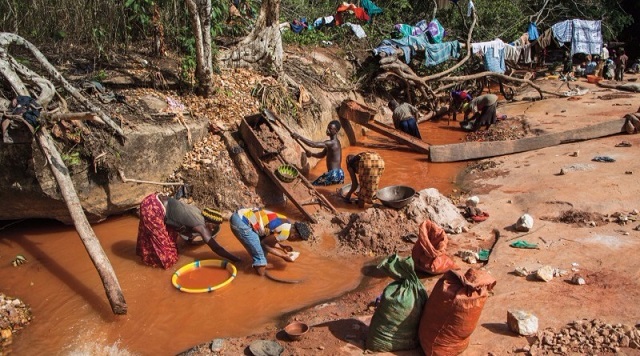Government should address challenges bedeviling small-scale chrome miners


There’s strong need by the Government to invest in mining machinery so that small scale chrome miners increase production
Gibson Mhaka, Senior Features Reporter
Small-scale chrome miners just like small-scale and artisanal gold miners are an integral part of Zimbabwe’s economy with the potential to make a more meaningful contribution to the growth of the economy through revenue generation and employment creation.
Chrome is an important base metal mainly used in the stainless steel industry. Chrome mining in Zimbabwe is concentrated along the Great Dyke which contains an estimated 10 billion tonnes of reserves.
Africa has the largest ore reserves in the world and it is estimated that Zimbabwe and South Africa have more than 80 percent of the world’s ore reserves.
Currently, the product is on demand in Asia, particularly in China and Singapore.
According to a research document submitted to the Ministry of Mines and Mining Development late last year and prepared by Confederation of Zimbabwe Small Scale Chrome Miners, the sector, if fully funded, had the potential to employ over 7 000 people.
But this sector which is the second largest employer after gold in the small-scale mining sector is fragile and continues to operate below capacity on the back of a host of challenges, which have added to the cost of production resulting in the price of the mineral becoming unattractive on the international market.
The research document also highlighted that the country currently has over 2 000 small-scale chrome miners of which 10 percent are independent while 90 percent are on tributes and/contract mining with Zimbabwe Mining and Smelting Company (Zimasco) or Zimbabwe Alloys Ltd (Zim Alloys).
A few months ago Zimasco ceded 50 percent of its chrome claims to government to help ensure wider inclusion of locals in the sector.
The ceding of the claims, besides promoting indigenisation and empowerment of marginalised groups, is a welcome development given that contract mining or tributary arrangements have been a stumbling block for many small-scale miners in benefiting from the sector since the lifting of the ban on the exportation of chrome ore in 2015.
Government lifted the four-year ban on chrome exports which was imposed in 2011 as a way of promoting value addition of the mineral.
As a result of that move, small-scale miners can now export their chrome ore or concentrate through a special purpose vehicle, Apple Bridge Investments.
In 2016, Zimbabwe realised $115 million from the export of 149 000 tonnes of ferrochrome while $31 million was earned from the export of 284 943 tonnes of raw chrome.
According to the same report by the Confederation of Zimbabwe Small Scale Chrome Miners, there is an array of challenges inhibiting the growth of this sector. These include an unevenly balanced claims structure, unfavourable prices of chrome both on the local and international markets, lack of investment into the sector, the disempowerment of mining communities, negative impact of high electricity tariffs and shortages and conflicts between farmers and miners over land.
Massive environmental degradation by small-scale chrome miners, continued existence of tributary agreements with the major chrome claim holders as well as huge unsaleable stock piles of chrome dotted around the country following the ban of chrome exports by Government in 2011 are also among the challenges that are stifling production of the mineral in the country.
Given the above impediments, it is obvious that small-scale mining entrepreneurs are compelled to use rudimentary methods and often conduct their operations illegally while also using unorthodox business methods of extracting the mineral that is deleterious to the environment and human health.
Commenting on the challenges inhibiting the growth of this sector, Zimbabwe Miners’ Federation (ZMF) spokesperson, Mr Dosman Mangisi said lack of investment in mining machinery was posing a serious threat to Zimbabwe’s vibrant small-scale chrome mining industry.
He said the majority of the miners were producing below 100 tonnes of chrome and attributed this low production to lack of machinery.
“There’s strong need by the Government to invest in mining machinery so that small scale chrome miners increase production. From our research as ZMF, we found that the majority of small-scale miners were producing below 100 tonnes of chrome and this low production is being attributed to lack of machinery.”
“We also found out that smelting companies should be encouraged to acquire modern technology which reduces operational costs whilst yielding high production levels,” said Mr Mangisi.
He also noted that limited access to affordable credit lines and low prices for the base metal were some of the challenges facing the chrome sector.
Chrome prices in the country are now determined by government through a chrome buying unit, Apple Bridge Investments, to which small scale chrome miners sell the mineral.
The metal is, however, marketed by Minerals Marketing Corporation of Zimbabwe (MMCZ).
MMCZ deputy general manager responsible for marketing Mr Masimba Chandavengerwa also acknowledged lack of funding as a major challenge bedeviling the sector saying it was seriously threatening viability of small-scale chrome miners.
“The major challenge affecting small-scale chrome miners is funding. Our plea to the Government is that it arranges credit facilities in conjunction with local banks to provide funds to chrome miners so that they could buy machinery and increase production.
“Another important issue is the mining methods used by these small scale miners. They should be trained so that their mining becomes more environmentally sustainable. Training helps them to develop and integrate practices that reduce the environmental impact of mining operations,” observed Mr Chandavengerwa.
His call came after realising that the current chrome mining activities were primarily artisanal and restricted to mainly open cast mining, which is an environmental hazard.
ZMF chief executive Mr Wellington Takavarasha agreed that the sector is in dire need of capital for both sustenance and ramp up and urged small-scale miners that were allocated chrome claims secured from Zimasco to quickly acquire machinery and modern technology so as to boost their production levels.
“While the Government has moved on empowerment of the small-scale miners, as ZMF we do appreciate that they have limited capacity in terms of capitalisation and technology. We believe that without these interventions, the chrome sector may not give us as much value as we want,” he said.
From Mr Takavarasha’s observations, it is clear that small scale chrome miners if fully supported by the Government have the potential to make a more meaningful contribution to the growth of the economy through greater revenue generation and employment creation.
One of the beneficiaries of the chrome claims secured from Zimasco, Mr Given Moyo from Shurugwi urged the Government to assist them in finding markets for the mineral.
“Despite the huge deposits of proven and unproven reserves in the ground, the country is not recognised as a significant producer on the world market.
“This is an indication that the country is failing to fully exploit this mineral to its advantage.
“Therefore, it is imperative for government and other key players in the sector to actively work together to create a conducive environment that will lure investment which would spur the growth of the independent small-scale producers, large scale producers and smelters,” said Mr Moyo.
Notwithstanding the challenges, the sector is upbeat about the prospects for 2018, if it secures capital for operational and equipment requirements at affordable rates.
Government should also create a conducive environment that lures investment into the sector by ensuring that there are no policy inconsistencies governing the mining sector while all the key Government institutions in the chrome sector be coordinated to enforce compliance in order to minimise some of the challenges facing the sector.
In short, all key impediments should be removed to allow the sector to grow and optimally contribute to the socio-economic development of the country.











Comments